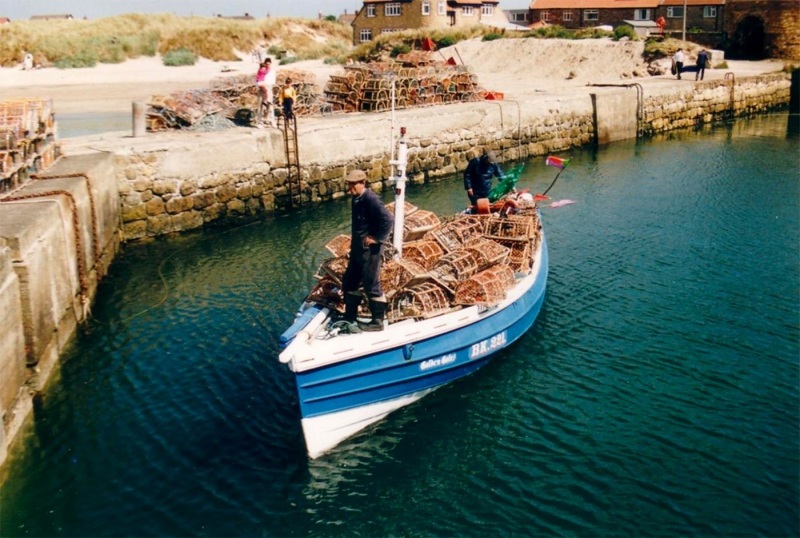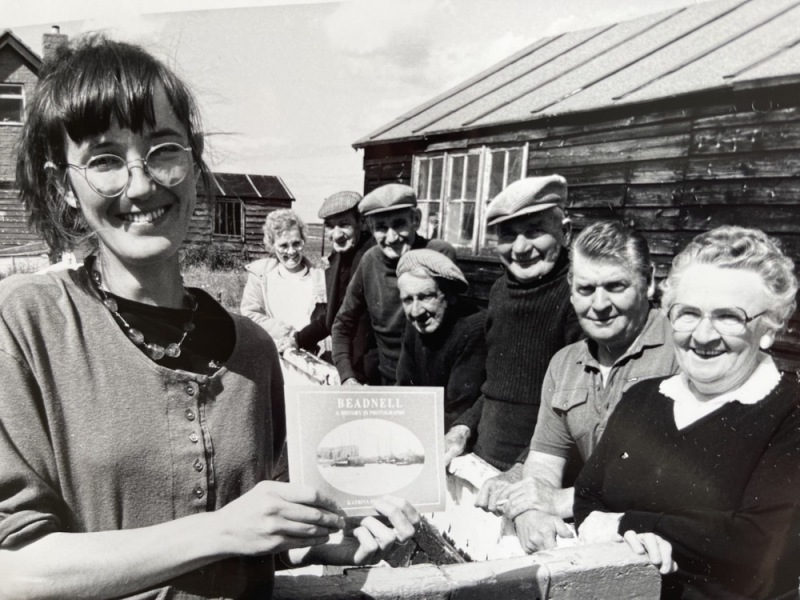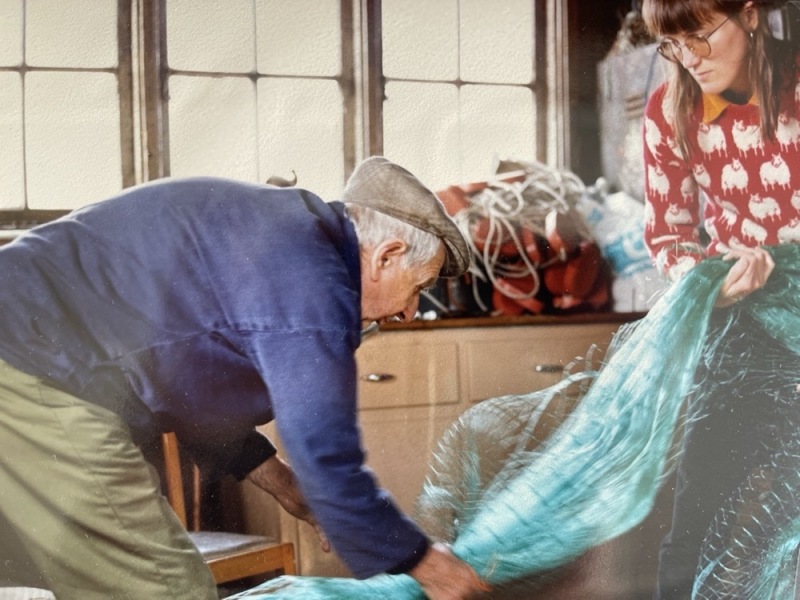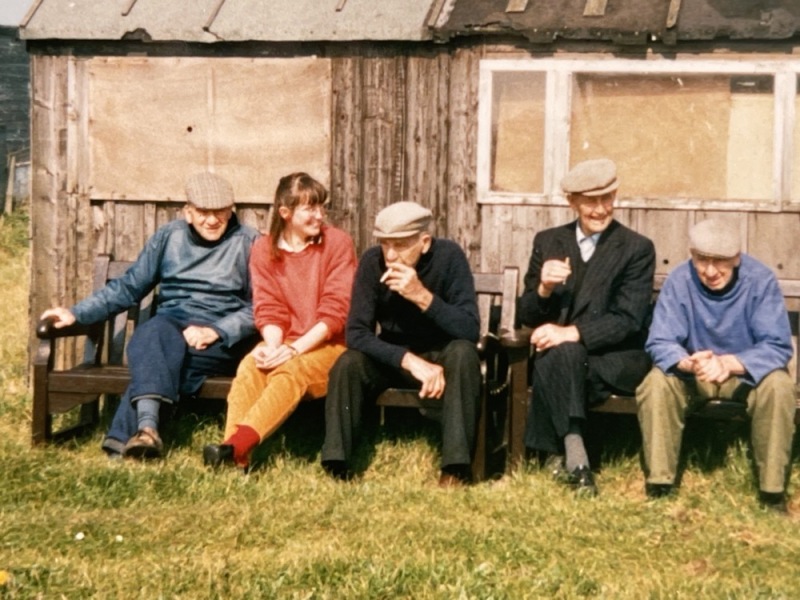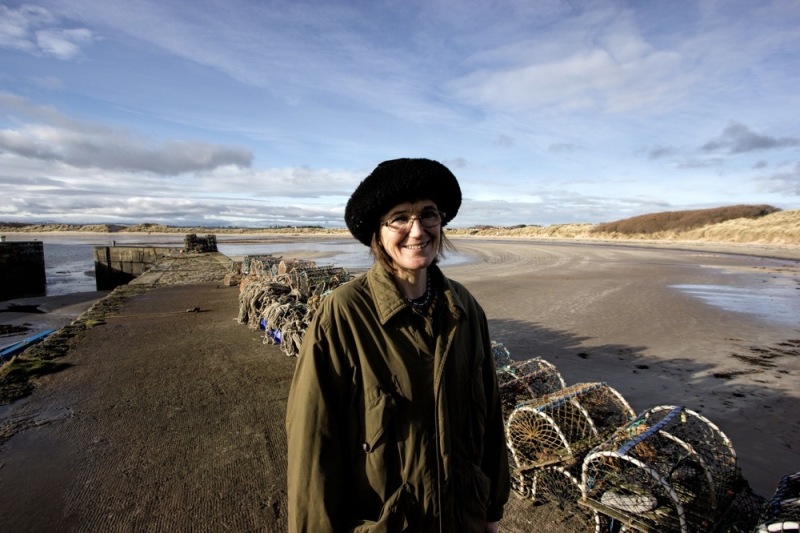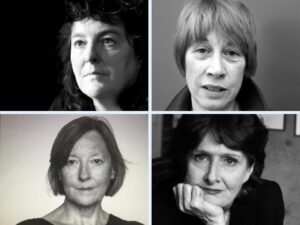Rowan Bell travels to Amble on the North Sea coast of Northumberland to talk to poet, historian and broadcaster Katrina Porteous about fishing, survival and extinction
When my children were small I took them on holiday to Northumberland and we went to Cocklawburn Beach. It’s a wonderful stretch of sand gently shelving to the sea, perfect for paddling. But this is Northumberland; it’s cold even in summer. Whilst my children splashed in the water wearing nothing but swimming costumes, I burrowed into the sand dunes for shelter, gathering towels and coats around me to escape the wind.
350 million years ago what is now Cocklawburn Beach was in the shallow estuary of a tropical sea. There are bands of rock between the sands, known as ‘skeers’, from the Old Norse, and they are full of fossils. In 2007 the fossil of a predatory three metre long, fleshy, lobed-finned fish with tusks and huge teeth was discovered here. It was a ‘walking fish,’ able to move on land as well as swim, and it is thought to be the progenitor of all four-limbed animals, including humans. Geologists call this fish a rhizodont, and the name provides the title for Porteous’s new collection from Bloodaxe, due in June next year. Rhizodont is about survival and extinction within cultures, communities and languages, as well as in the natural world. Here’s the beginning of the title poem:
#rhizodont
Then, in a flash
It claps shut – an ambush –
Teeth, fangs, tusks – crunch, rip,
Snap. The rhizodont,
Dragging itself out of water.
The old world sinks and slips
Beneath its tilted strata.
We’re all on a journey.
This one’s about us …
Driving north on the coastal road to meet Katrina in the fishing town and former coal port of Amble I get a strong feeling of transition to a different country. I suppose that is because I’m normally travelling south when I journey from my home on the North York Moors. South is where the work is. When I go north it’s for tourism.
We meet in The Old Boat House restaurant in the harbour for an early supper and choose from the local catch on the daily specials board. An enormous plate of langoustines arrives for Katrina, and a lobster for me. “There’s a lobster hatchery at the Northumberland Seafood Centre next door,” says Katrina. “They raise lobster larvae from local berried hens [female lobsters with eggs] and release them when they’re big enough to safely burrow into the seabed.”
At least the edge of the harbour is still stacked with lobster creels and there are fishing boats bobbing up and down at anchor. We see a few of the traditional cobles whose flat bottoms and high prows enable them to land on the wide Northumberland beaches and face the North Sea waves. Katrina tells me that these are used now as pleasure boats rather than for fishing. In other places the fishermen have gone altogether.
I ask Katrina how she ended up in Beadnell, just north of Amble, as a freelance poet, historian and broadcaster. It’s not a lucrative profession and with a first-class degree in history from Cambridge, followed by a Harkness fellowship at Harvard, surely she could have chosen a more secure career pathway.
“That’s what my mother used to tell me frequently, but when my grandmother left her house in Beadnell to my father I asked if I could go and live there,” says Katrina. “The fishermen sat outside the huts at the bottom of the road, and I went to talk to them. People knew my grandparents, so it was easy for me to sit with them, gather stories and learn the local language. May Douglas, a fisherman’s wife, and her brother-in-law Charlie, held a wealth of local knowledge and this led to my first book in 1990, Beadnell – a History in Photographs.”
Katrina made copious notes from these conversations and created an archive, a record of something valuable that is disappearing within our lifetimes. She has written particularly about the fishermen’s local language, and has also captured something of the ‘pitmatic’ dialect, now vanishing from the former mining communities of Northumberland and Durham, as in these two stanzas from ‘A Short Walk from the Sea’s Edge’:
Now hogweed and scrub willow are slowly erasing that hard-drive;
Shales, pyrites, oxides, remember hermit crabs, rock pools.
Inland, behind the railway line, our Billy’s grand-daughter,
Chloe, checks in with Insta before school.
Our Billy’s Chloe has no word for bluebell or cowslip,
Willow or yellowhammer. Granda’s pigeons wheel and turn
Over the tracks, but she doesn’t know stobbie from skyemmie.
A soft breeze blows from the beach. A smell of burning.
Katrina and I spend a bit of time talking about poets and poetry, changing trends, and the importance of craft and prosody. Katrina says poems need to be spoken and their rhythms articulated. Her astonishing 1999 spoken poem in Northumbrian, ‘The Wund an’ the Wetter,’ with pipes by Chris Ormston, was the first piece of Katrina’s work that I heard, and it’s like magic. I have to be honest – I have trouble understanding the poem in written form; Northumbrian is heavy going. But when I hear Katrina read it, the words and music infuse the subconscious and images dance through my imagination as if I was actually seeing the places and characters acting out their lives and stories.
I have trouble understanding the poem in written form; Northumbrian is heavy going. But when I hear Katrina read it, the words and music infuse the subconscious and images dance through my imagination as if I was actually seeing the places and characters acting out their lives and stories
That language is saturated with the past, but what does the future hold for Amble? Katrina shows me an app on her ‘phone that contains directions, pictures, information and podcasts about a new sculpture trail in the town. The trail is called ‘The Bord Waalk’, which translates as ‘bird walk’ (not ‘broad walk’ or ‘board walk’ – see what I mean about Northumbrian?) and it’s full of Katrina’s poems. Here’s one:
The Auld Watter
Flooded, or about to flood,
The saltings stretch between the tides.
Salt, wet, silvery light.
Tree trunks, sand. The wildest place.
Water glitters. Something lets loose
Its cry. A ripple. Rings dilate.
Where once a river emptied out,
Only uncertainty. Over and over
A curlew flings its loop of sound –
Flings it and captures wildness in its noose.
Tourism is now an important source of income for the town and the local development organisation is investing in creative arts. Katrina is in conversation with Andrew Gooding of the Northumberland Seafood Centre and Amble Development Trust, and tells me that they are discussing ideas about how to use poetry to help raise the profile of fishing, both for the community and for tourism.
For the fishing communities themselves the future is less certain. Katrina recently supported a local campaign against a government proposal for a Highly Protected Marine Area around Holy Island, 30 miles north of Amble, which would have banned all fishing in those waters. The area is already heavily protected, and the local community campaigned against the total ban on economic and cultural grounds. Their argument was supported by Katrina’s research into the history of fishing and the longevity of the culture and tradition. The Islanders were successful, and the new designation will not apply.
In Beadnell it is now too late for the salmon fishers
In Beadnell it is now too late for the salmon fishers. In recent years wild salmon populations have crashed, for complex environmental reasons which include the industrial extraction of their natural food supply of sand eels for livestock feed and agricultural fertilisers. Sport fishing for salmon in Northumberland’s rivers has powerful advocates, and for decades competitive tensions existed between them and the fishermen who made their living from netting salmon on the coast. Gradually the terms of the licences were tightened to the point where this part of the fishermen’s year no longer offered a livelihood, the licences could not be handed down, and the young men who would have kept the tradition alive turned away to follow other paths.
“The fishermen I knew who were born before World War I were true environmentalists,” Katrina says. “They grew up in a non-industrial fishery, which had been largely sustainable over hundreds of years. I’m not romantic about the past – it was a very hard life. But they wanted to hand on the best of it to their grandchildren, and they could see what was going wrong, as industrialisation increased productivity at the expense of the natural resource. I admired them, and learnt from them that, at best, human activity is not at odds with nature but part of it. Small scale, artisan fishing, such as you still find in Holy Island and Amble, can be sustainable, as the communities’ evolving language, stories and traditions embed them in their own place, which they know, care for, and pass on to the future.”
Katrina Porteous’s website is here. You can hear an excerpt from ‘The Wund an’ the Wetter’ on The Poetry Archive here.

